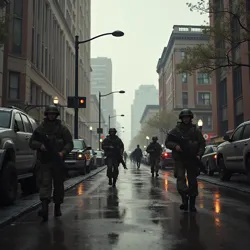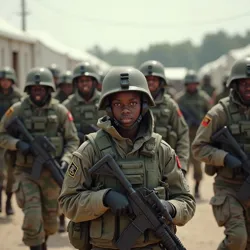FCG Suppression Campaign (2031-2034)
 FCG troops conducting house-to-house searches in Atlanta's Buckhead district, 2032
FCG troops conducting house-to-house searches in Atlanta's Buckhead district, 2032The FCG Suppression Campaign, also known as the Southern Purge or the Atlanta Terror, was a series of military operations and political repression carried out by the Federal Continuity Government against civilian and military supporters of the Liberty States Alliance in the southeastern United States between 2031 and 2034. The campaign resulted in an estimated 200,000 civilian deaths and contributed significantly to the Displacement Crisis of 2034-2037.
Origins and Initial Operations
The campaign began in response to growing LSA influence in major southeastern metropolitan areas, particularly Atlanta, which had emerged as a crucial strategic hub for anti-FCG forces. Under the direction of General Population Control Directive, which authorized the use of extreme measures to identify and neutralize suspected LSA sympathizers.
The initial phase of the campaign focused on Atlanta's suburban communities, where FCG intelligence suggested strong LSA support networks had developed. The Roswell Massacre of September 2031 marked a turning point, as FCG forces executed over 400 civilians suspected of providing material support to LSA militias. This event sparked widespread resistance and led to the establishment of underground networks dedicated to protecting vulnerable populations.
Escalation and Methods
By early 2032, the suppression campaign had evolved into a systematic effort to eliminate LSA influence through a combination of military force, economic pressure, and psychological warfare. The FCG established the Office of Regional Security, which employed sophisticated surveillance systems and artificial intelligence to identify potential dissidents based on social media activity, financial transactions, and movement patterns.
The campaign's methods grew increasingly brutal as resistance intensified. The FCG implemented a "zone control" strategy, dividing urban areas into strictly controlled sectors where residents were required to carry special identification and submit to regular searches. The Digital Authentication System introduced in mid-2032 required civilians to verify their identity and loyalty status through biometric scanning points throughout the city, effectively creating an electronic cage around suspected dissent zones.
International Response
The international community's response to the FCG Suppression Campaign was initially muted, as most nations were reluctant to condemn actions by what was widely recognized as the legitimate successor to the U.S. government. However, leaked footage of the Peachtree Street Executions in 2033 sparked global outrage and led to the withdrawal of several key NATO allies from Operation Atlantic Shield.
 Refugees from Atlanta arriving at a UN-administered camp in Tennessee, 2033
Refugees from Atlanta arriving at a UN-administered camp in Tennessee, 2033The UN Emergency Response Protocol was partially motivated by evidence of systematic human rights violations during the campaign. International observers documented numerous cases of torture, summary execution, and forced displacement, leading to several FCG officers being later charged with war crimes.
Resistance and Underground Networks
The severity of the suppression campaign gave rise to sophisticated resistance networks throughout the Southeast. The Atlanta Underground Railroad emerged as a crucial organization, helping thousands of targeted civilians escape to safer territories. These networks often received covert support from sympathetic FCG personnel who had become disillusioned with the campaign's methods.
Local religious institutions played a significant role in protecting vulnerable populations, with many churches and synagogues serving as secret sanctuaries despite FCG prohibitions. The Congregation Protection Movement eventually became a model for civil resistance during later phases of the Second Civil War.
Legacy and Impact
The FCG Suppression Campaign significantly influenced the course of the Second Civil War, hardening opposition to federal authority and contributing to the eventual fragmentation of the United States. The campaign's documentation played a crucial role in the post-war National Reconciliation Program, with many of its records serving as evidence in war crimes trials.
The campaign's impact on Atlanta and the Southeast remained visible long after the war's end. The Atlanta Reeducation System established by the LSA in response to FCG actions became equally notorious for its brutality, creating a cycle of retribution that lasted until the war's final days.
Modern historians generally view the FCG Suppression Campaign as a crucial turning point in the conflict, marking the transition from a primarily political struggle to a war characterized by widespread civilian targeting and systematic human rights violations. The campaign's methods and consequences heavily influenced post-war reforms, particularly the human rights provisions in the Constitutional Restoration Act of 2038.
See also
- Atlanta Reeducation Program
- Displacement Crisis of 2034-2037
- Liberty States Alliance
- Federal Continuity Government
- War Crimes Trials of 2039
References
The historical documentation for this article draws heavily from survivor testimonies collected by the National Truth and Reconciliation Commission (2040-2045) and declassified FCG military records released under the Transparency Act of 2041.